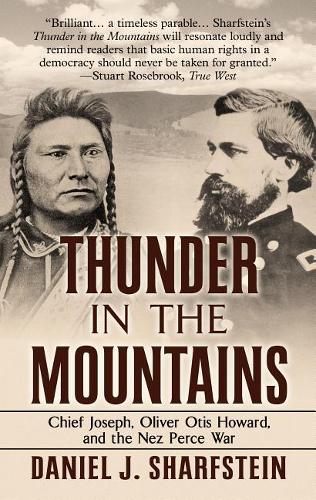
Thunder in the Mountains: Chief Joseph, Oliver Otis Howard, and the Nez Perce War
(Hardback, Large Print Edition)
Publishing Details
Thunder in the Mountains: Chief Joseph, Oliver Otis Howard, and the Nez Perce War
By (Author) Daniel Sharfstein
Thorndike Press
Thorndike Press
17th April 2019
Large Print Edition
United States
Classifications
General
Non Fiction
Social and cultural history
Indigenous peoples
Military history
Local history
Biography: historical, political and military
Biography: general
Physical Properties
Hardback
Width 160mm, Height 236mm
Description
Oliver Otis Howard thought he was a man of destiny. Chosen to lead the Freedmen's Bureau after the Civil War, the Union Army general was entrusted with the era's most crucial task: helping millions of former slaves claim the rights of citizens. He was energized by the belief that abolition and Reconstruction, the country's great struggles for liberty and equality, were God's plan for himself and the nation. To honor his righteous commitment to a new American freedom, Howard University was named for him.
But as the nation's politics curdled in the 1870s, General Howard exiled himself from Washington, D.C., rejoined the army, and was sent across the continent to command forces in the Pacific Northwest. Shattered by Reconstruction's collapse, he assumed a new mission: forcing Native Americans to become Christian farmers on government reservations.
Howard's plans for redemption in the West ran headlong into the resistance of Chief Joseph, a young Nez Perce leader in northeastern Oregon who refused to leave his ancestral land. Claiming equal rights for Native Americans, Joseph was determined to find his way to the center of American power and convince the government to acknowledge his people's humanity and capacity for citizenship. Although his words echoed the very ideas about liberty and equality that Howard had championed during Reconstruction, in the summer of 1877 the general and his troops ruthlessly pursued hundreds of Nez Perce families through the stark and unforgiving Northern Rockies. An odyssey and a tragedy, their devastating war transfixed the nation and immortalized Chief Joseph as a hero to generations of Americans.
Recreating the Nez Perce War through the voices of its survivors, Daniel J. Sharfstein's visionary history of the West casts Howard's turn away from civil rights alongside the nation's rejection of racial equality and embrace of empire. The conflict becomes a pivotal struggle over who gets to claim the American dream: a battle of ideas about the meaning of freedom and equality, the mechanics of American power, and the limits of what the government can and should do for its people. The war that Howard and Joseph fought is one that Americans continue to fight today.
Reviews
Intimate, propulsive and ultimately heart-breaking... a compassionate military history and a shrewd examination of how cultural legends are created.--Julie M. Klein
An important book that will doubtless enjoy a broad readership among the general public and should be read by students as well as specialists interested in the Civil War era, military history, the history of the American West, and indigenous studies.
A brisk narrative of one of the last major collisions between Native Americans and white America. [Sharfstein's] two main characters are complex and compelling--Chief Joseph, a thoughtful, powerful speaker who spent years trying to find a way for his people to live alongside American settlers, and General O.O. Howard, a moralistic liberal Army general whose fate it was to crush Joseph's small Nez Perce tribe.--Thomas E. Ricks
A good post-Independence Day read in the sense that it really does show the scope of U.S. power, who makes certain decisions about the rights of native peoples, the meaning of liberty and equality and its relationship to ethnicity, color, place, and class.--Dana Williams
A thorough and well-documented work of history [that] delves into the human condition like the best fiction, offering insights not only into historical events but also into the ways people can grow and evolve.
Magnificent and tragic.... Sharfstein is a wonderful storyteller with a deep knowledge of all the relevant source material from the period. His narrative is rich with fascinating historical details.--Nick Romeo
Sharfstein presents his view without polemic. Indeed, the writing is lyrical--smooth and engaging, albeit with scrupulous bibliographical notes to underscore its historical authenticity.... Sharfstein shows how at each interaction with federal authorities and their texts, Joseph focused on understanding not so much the particular words as the mechanisms through which 'authoritative' documents were created, trying to find his way in the wilderness of American power.--Peter d'Errico
Solidly researched, well-written and engaging.
Daniel Sharfstein offers a searing account of an American tragedy: how Oliver Otis Howard, a champion for the rights of freed slaves, became an architect of the dispossession and subjugation of Native people. This beautifully written book will change the way readers think about the era of Civil War and Reconstruction.--Ari Kelman, author of A Misplaced Massacre: Struggling Over the Memory of Sand Creek
